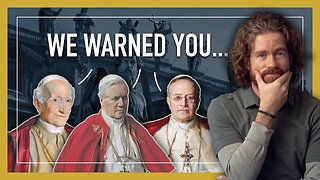Premium Only Content

Heresy is a Problem
Join the Reinforcements at https://brianholdsworth.ca
Music written and generously provided by Paul Jernberg. Find out more about his work as a composer here: http://pauljernberg.com
Spanish translations by Vélez Translations, http://www.veleztranslations.com
Whenever I’ve had the opportunity to learn about some theological controversy that formed some part of Church history, I can’t help sympathizing with the person or group who was found to be wrong.
This is especially true for the early Christological controversies when they were trying to understand more precisely who Jesus was and what the nature of the relationship was between Christ’s humanity and divinity.
Because whenever I’ve immersed myself in some of those original sources, my first reaction is usually surprise at how sophisticated and complex these early debates were to the point that I find myself admitting that, if I was involved in a controversy like that, I could have easily found myself on the wrong side.
One example that comes to mind for me was the controversy between Nestorius and St. Cyril and the rest of the Church. I won’t bore you with the details, but Nestorius in an effort to appease two theological factions under his care, tried to compromise between them with a proposal that within Jesus were two hypostases, hypostatises, hypostatic? Two substances! – one divine and one human.
In reality, there was one hypostatic union of humanity and divinity, but two natures, one divine and one human.
Now, as an average layman looking at a controversy like that, my initial reaction is often one of almost intellectual despair because if that’s how nuanced and dense our theology can get, and it does, what are the chances that any of us aren’t walking around with all kinds of muddled heretical ideas floating about in our heads? After all, it’s easy to make mistakes right?
In Nestorius’ case, he was removed as Patriarch of Constantinople and eventually exiled to a dessert monastery. And given how easy it appears to be to make intellectual mistakes like that, it’s hard not to sympathize with people like Nestorius who were on the losing end of these controversies.
So how do we reconcile the sever consequences that heretics like Nestorius faced in the history of the Church – sometimes with penalties as severe as death?
Well, the first thing to understand is that heresy, the kind that goes down in the history books, wasn’t a mere intellectual error. In the case of Nestorius, there were several gatherings and councils in which Patriarchs and bishops gathered to debate and discuss whatever controversy was at large.
And they did so with the intention of coming to an agreement about what the truth of the matter is – which is where we get doctrines and dogmas from.
After it’s all said and done, those who had proposed the wrong solution, the heretical one, are given the opportunity to accept the new dogma and this is what distinguishes them from people who have simply made an error to those who persist in heresy.
And in Nestorius’ case, he chose to persist in it. And it’s this audacious persistence that is the true revelation of how evil heresy is.
Heresy, at this point, becomes a rejection of truth and a rejection of your community. It’s the obstinate insistence that you and you alone are right and that instead of committing yourself to being reformed in the image of God through his Church, you want God and his Church to be conformed to your image and your ideas.
Read the whole transcript at https://brianholdsworth.ca
-
 12:28
12:28
Brian Holdsworth
1 year ago $0.05 earnedThe Popes Warned Us About This
3001 -
 2:34:32
2:34:32
Badlands Media
5 days agoCODEX 9/11
270K205 -
 1:53:43
1:53:43
Nerdrotic
6 hours ago $0.27 earnedMysteries of 3I/ATLAS | Forbidden Frontier #113
41.6K4 -
 2:04:21
2:04:21
vivafrei
1 day agoEp. 278: D.C. Peace Wave! Big Tish & Nipple Judge SPANKED! "Maryland Man" Trafficker FREE & MORE?
90.7K109 -
 LIVE
LIVE
Damysus Gaming
2 hours agoBorderlands 3 - Part 8 - FL4K Time | Children of the Vault be Warned!
56 watching -
 1:30:28
1:30:28
Patriots With Grit
5 hours agoWhat You Should Know About Harmful Vaccine Ingredients And What To Say To Your Doctor, Pediatrician, Health Department or School When They Pressure You, Your Kids Or Your Family Members | Dr. Bryan Ardis, D.C.
11.7K5 -
 LIVE
LIVE
This is the Ray Gaming
2 hours ago $0.01 earnedSunday Night Live with the Boys | Rumble Premium Creator
50 watching -
 2:02:16
2:02:16
ItsMossy
2 hours ago🍃NEW MIC WHO THIS🍃DRIVING SIM GO BRRR🍃420 SESH🍃
3.86K1 -
 LIVE
LIVE
THOUGHTCAST With Jeff D.
2 hours agoSunday night Fortnite With ScottishVikingGaming & crew
27 watching -
 3:11:45
3:11:45
a12cat34dog
3 hours agoSOLID DAWG RETURNS :: METAL GEAR SOLID :: 1998 IS UNFORGIVING {18+}
6.94K1